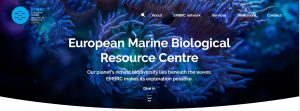Providing access to marine genetic resources is one of EMBRC’s primary services. The EMBRC is committed to facilitating access to and supply of marine biological and genetic material to users in compliance with international, European and national legal frameworks regarding Access and Benefit Sharing (ABS). The European Blue Biobank (EBB) project, under the umbrella of EMBRC, supports this aspiration by promoting compliance with ABS regulations derived from the Nagoya Protocol and implemented in Europe through the EU ABS Regulation that came into force in 2014 as well as Member State’s access legislations, where applicable. This regulatory framework, although effective in protecting the rights of the provider country, puts burden on the user to demonstrate lawful utilization and there are concerns that the added bureaucracy in relation to ABS regulations may be detrimental to Research, Development and innovation activities. In order to help navigating the EU ABS Regulations to both users and research infrastructures, facilities, biobanks and collections, the EBB project has launched a series of webinars. They aim to provide an introduction to EU Access and Benefit Sharing regulations for collections and users, including information about its scope, recommendations for institutions with users and collections of marine genetic resources and for users on how to manage ABS compliance, and a description of the EU Registers to support ABS compliance. This series of webinars have been authorized by Heidi Tillin from the Marine Biological Association (MBA), Anne Emmanuelle Kervella and Arnaud Laroquette from EMBRC-ERIC, and Belén Martínez, Fiz da Costa and Maria del Mar Costa Portela from the University of Vigo. They are accesible through the MBA YouTube channel.
European Union ABS User Networking Event
On Monday, June 14, 2021, the Leibniz Institute DSMZ/German Nagoya Protocol HuB will be hosting an online EU ABS Networking Event. This meeting will be organized together with the European Marine Biological Resource Centre (EMBRC), the Union for Ethical BioTrade, ABS-int, the Dutch ABS National Focal Point (hosted by Wageningen University and Research) and the Natural History Museum London.
Our colleague and EBB partner Anne Emmanuelle Kervella, from CNRS and Station Biologique de Roscoff, will participate in this event. The event´s main objective will be to showcase the efforts made in the European Union to support users of genetic resources in their respective sectors or regions with access and benefit-sharing (ABS) and compliance requirements. It will be divided into two parts: one to find out what has already been done and the other to find out what still needs to be done.
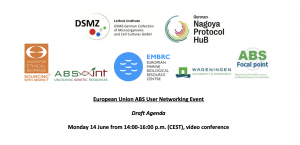
You can check out the draft agenda here and you can register online here.
Seminar on the utilization of genetic resources within the framework of the Nagoya Protocol and the regulations for its implementation
Next May 28, 2021, it will be organized a seminar on the utilization of genetic resources within the framework of the Nagoya Protocol and the regulations for its implementation. This event is co-organized by the Spanish Bank of Algae of the University of Las Palmas de Gran Canaria, an entity managed by the Fundación Canaria Parque Científico Tecnológico, together with the Society for the Economic Promotion of Gran Canaria (SPEGC), the TFC Herbarium (SEGAI) of the University of La Laguna Tenerife (ULL), the Museum of Natural Sciences of Tenerife (MUNA), the Canarian Institute of Agricultural Research (ICIA), the Canarian Botanical Garden ‘Viera y Clavijo’-CSIC Associated Unit, Cabildo de Gran Canaria and the Herbarium of Marine Sciences (BCM-ULPGC).
This initiative´s objective is linked to the promotion of cooperative relationships between companies and entities that are part of the blue biotechnology platform. Specifically, this seminar aims to provide a better understanding of the Nagoya Protocol and the European and Spanish Access Benefits Sharing regulations, informing on when it is applied and resolving the doubts that academia and industrial sectors may have about its application.
The day will be divided into a first block dedicated to the Nagoya Protocol and the legislation on access and utilization of genetic resources in research and industry, where you can learn more about its application and its application in the Canary Islands. The second block will focus on deepening the knowledge of the Biological Collections of the Canary Islands, as agents of ex-situ conservation of biodiversity and suppliers of genetic resources to the industry. You can check here the agenda and other information of the event.
The event will be free of charge and broadcasted via zoom. Registration is required and can be done here.
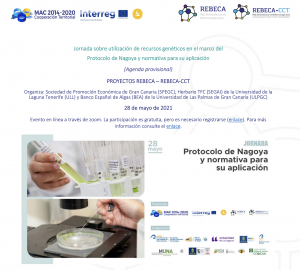
EBB creates a centralized integrated biobank database and improves operational standards
The (bio)diversity of culture collections and biobanks regarding different types of organisms is of great value, specially in the pursuit of new biological products for the development of the blue bioeconomy, which makes these biobanks (most of them part of EMBRC), a very sought-after asset in applied research.
However, the organizational complexity of these culture collections and biobanks makes very difficult to navigate through them, as one may have to search through different libraries or databases, since each biobank has its own database. This is not only troublesome for anyone who wishes to find the right organism for its research, but it also brings problems from the point of view of traceability of Marine Biological Resources (MBR), a key aspect of Access and Benefit Sharing (ABS) regulations.
EBB´s consortium involves marine culture collections and biobanks belonging to ten European institutions and, led by Dr. Ian Probert, manager of Roscoff Culture Collection at Station Biologique de Roscoff (Sorbonne Université), EBB has developed two management tools: TRACK and TRACE.
TRACK has born out of the need of homogenizing the database organization of all the culture collections and the biobanks that are part of EBB. It is an e-tool designed to manage and provide access to data pertaining to sampling and maintenance of marine biological resources (collected in the wild, in sample collections or cultured) from biobanks.
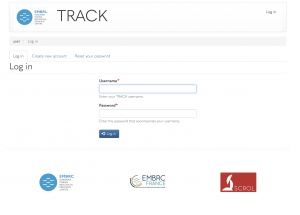
TRACE is an online database that will serve as a common access system to marine biological resources collections. This searchable catalogue groups the full range of marine biological resources that can be provided by the marine stations of EBB, constituting the European Blue Biobank.
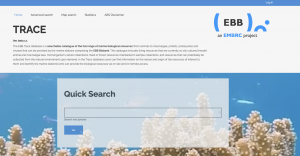
Both tools will be part of the legacy that our project will leave to the EMBRC community and to the marine research and science.
Workshop on Reproductive Biotechnology and Cryobanking in Aquatic Species
The 4th edition of the Workshop on Reproductive Biotechnology and Cryobanking in Aquatic Species, within the framework of the project EBB (European Blue Biobank) is going to be held. The Workshop is aimed towards young and professional researchers, as well as representatives from industry. The course will be focused on techniques for germline cryobanking integrating aspects of different expertise. The covered topics are in the attached poster.
The Workshop will highlight the most recent developments in each topic, promoting a strong interaction between the attendees and the experienced researchers and private companies working in different techniques for germline cryobanking.
This year, the 4th edition will take place online, via ZOOM platform, between 7-9th April 2021. The last day, consist of practical sessions that will take place at the facilities of the University of Algarve. Due to Covid-19 restrictions, priority will be given to local students and sessions will be limited to 20 participants. The selected participants for the practical sessions will be contacted by the organizing committee by email.
Participation is FREE, upon registration here, available until 2nd April.
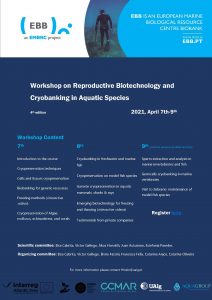
Register for the “Symposium on Biobanks and Marine Diversity” – EBB project FINAL EVENT
The “Symposium on Biobanks and Marine Diversity” is coming!
After more than 3 years of hard work, the EBB project is coming to an end. During the duration of the project, EBB partners have worked to achieve the main EBB project objective: to facilitate sustainable access to marine biodiversity, its associated data, and extractable products for local and international academia and industry users, and to incentivize biodiversity conservation in coastal ecosystems by promoting compliance with Access and Benefit Sharing (ABS) regulations derived from the Nagoya Protocol.
We would like to invite you to participate in the “Symposium on Biobanks and Marine Diversity” which will take place online on 23rd March 2021 from 09:30 to 12:30 (CET). In this event the main EBB project outputs will be presented.
The draft agenda is available here.
We strongly encourage you to follow the event and please feel free to spread the word among your circles. This is an opportunity for biobanks, culture collections, researchers, academia, industry and policy makers, to be connected and a chance to learn about the management tools that EBB project has developed.
The registration is NOW CLOSED.
The event will be also live streamed at this link.
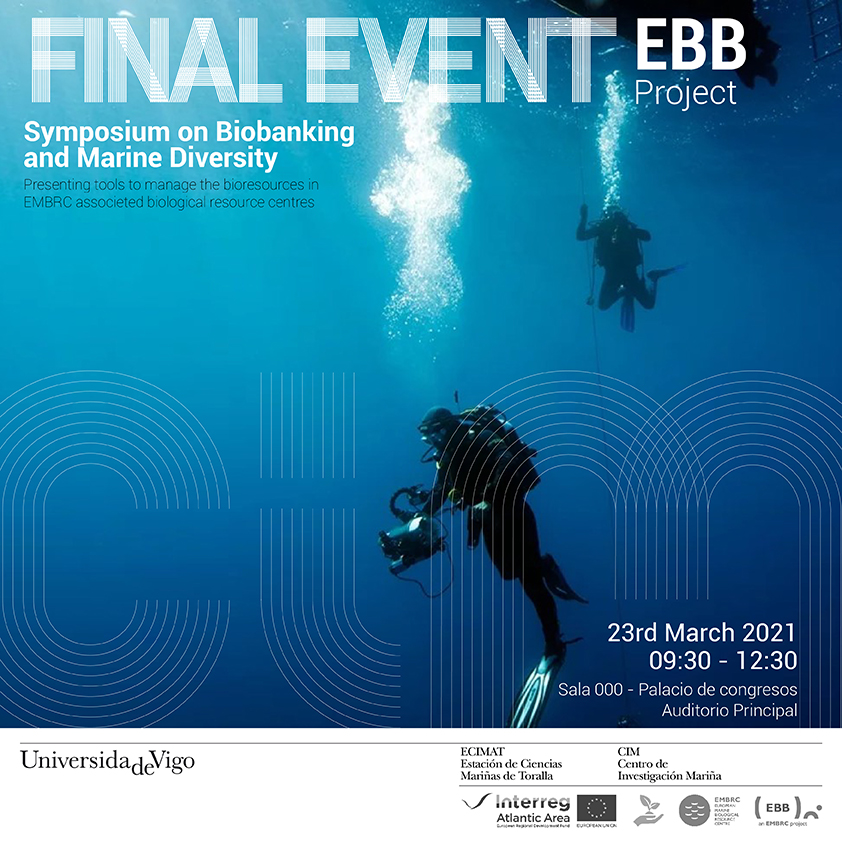
EBB FINAL EVENT: “Symposium on Biobanking and Marine Diversity”
The EBB project is coming to an end. As the final event of the project, a virtual symposium will be held on March 23rd (09:30-12:30 CET) on Biobanking and Marine Diversity.
The main goal of the EBB project is to facilitate sustainable access to marine biodiversity, its associated data, and extractable products for local and international academia and industry users, and to incentivise biodiversity conservation in coastal ecosystems by promoting compliance with Access and Benefit Sharing (ABS) regulations derived from the Nagoya Protocol.
The symposium is aimed to present the main outputs (management TOOLS) produced in the framework of EBB project during the last 4 years and initiate the spread of outcomes specially among EMBRC members, as well as other biobanks, culture collections and stakeholders.
The main results that will be presented are:
EBB TRACE database: a searchable catalogue of the full range of marine biological resources that could be provided by the EBB Biobank.
EBB TRACK tool: instrument for the provision of macroorganisms in culture collections service supply and biobank management.
“The EBB / EMBRC guide to ABS compliance. Recommendations to marine biological resources collections’ and users’ institutions”.
The practical guide for users “Seek, keep & transfer: A step-by-step guide to ABS compliance when utilizing marine genetic resources”.
The training webinars on key aspects of ABS.
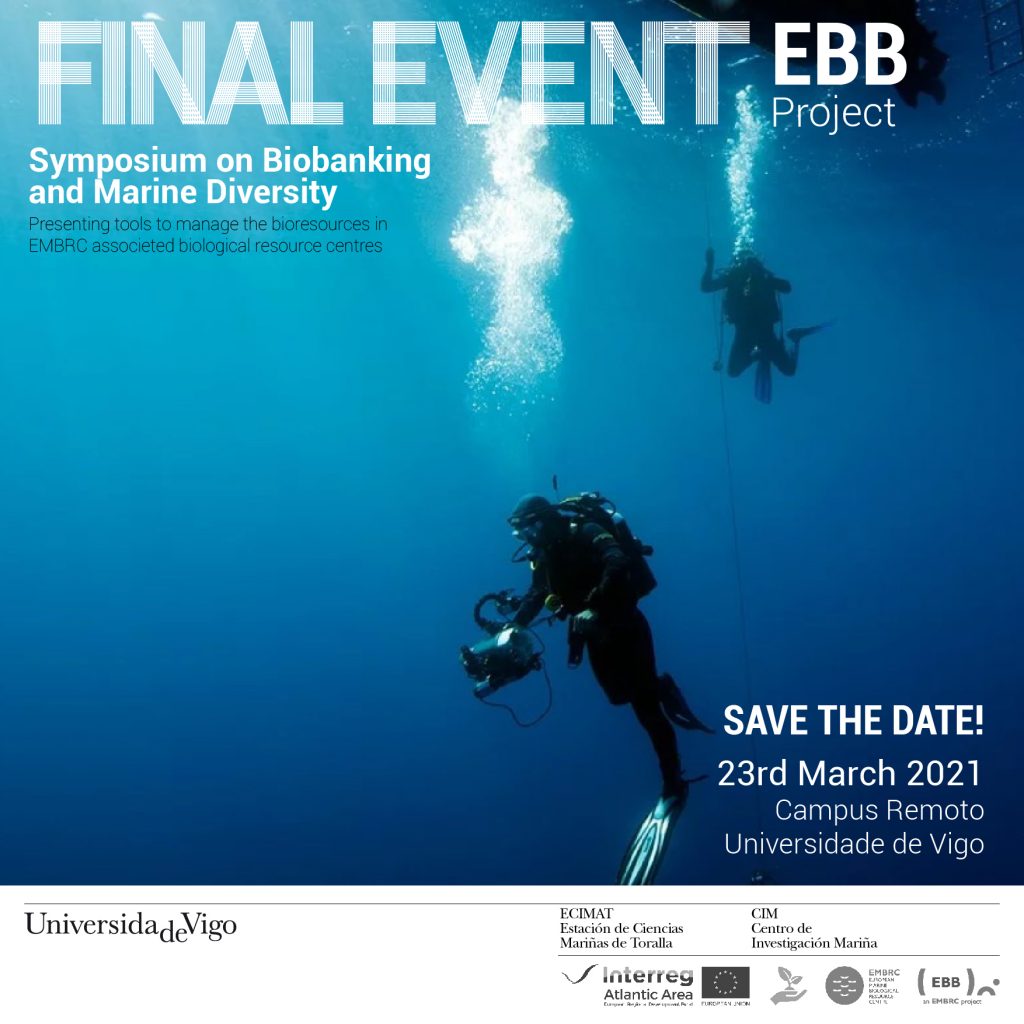
The BMCC of UPV/EHU presents its collection with the launching of its new website
The Basque Microalgae Culture Collection (BMCC), of the University of the Basque Country (UPV/EHU), maintains more than 600 strains of marine and freshwater microalgae and cyanobacteria, mainly from the Basque Country, although counts with species collected in different parts of the world.
This collection was registered within the World Federation for Culture Collections (WFCC, World Federation for Culture Collections) in 2020 and is part of the Spanish Network of Microorganisms (REDESMI). Among its taxonomical groups that can be found in collection in BMCC we can find different species of haptophytes, cryptophytes, dinoflagellates, chlorophytes, diatoms and cyanobacteria.
BMCC is part of the Plentzia Marine Station (PiE-UPV/EHU), which is one of the operators of the Spanish node of European Marine Biological Resource Centre (EMBRC-ERIC) and a partner in European Blue Biobank (EBB) project. BMCC facilitates access to biological resources with great biotechnological potential for both private and public companies or institutions. Moreover, the strains held at BMCC may play a pivotal role in biotechnological developments or be research focus leading to patent generation or scientific publication. Culture collections also play an important role preserving biodiversity, mission that has been recently underpinned under the biodiversity goals of the Convention of Biological Diversity and the entry into force of its Nagoya Protocol and its associated Access and Benefit Sharing (ABS) regulations.

In addition to supplying isolated algal strains already identified, the BMCC offers additional services such as the isolation and identification of species, the production and supply of culture media, the possibility of depositing strains in the collection or the characterization of some compounds present in microalgae. Such services are available for companies or researchers, both for basic and applied research.
This collection opens its doors to the rest of the world through its new website, which has an access portal that has been funded by EBB project, and that can be visited in this link
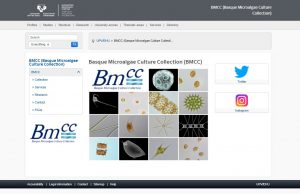
Workshop: “How to Do Nagoya: access to marine genetic resources in compliance with ABS regulations”
The next January 29th, members of the EBB project and the EMBRC ABS working group organize the Workshop: “How to Do Nagoya: access to marine genetic resources in compliance with ABS regulations”, as part of the agenda of the ASSEMBLE Plus Conference 2021. The main goal of this workshop is to share with the service providers, and its users from academia and industry, in Assemble+ the work carried out within EMBRC to help such community to comply with their Access and Benefit Sharing (ABS) duties in the light of the Nagoya protocol when utilizing marine genetic resources.
One of the main aims of the European Blue Biobank (EBB) project is supporting biobanks and culture collections to comply with these regulations as holders and providers of marine genetic resources. According to this, EBB project has been providing support to end-users to comply with ABS regulations for their access to marine genetic resources. With the aim of being a reference for other users, and also for biobanks and culture collections, EBB project together with the ABS working group of EMBRC, have produced a Best Practice Guidelines on ABS for access to marine genetic resources, and a “step by step” short guide. Both documents will be presented by Anne Emmanuelle Kervella and Ian Probert from Biological Station of Roscoff, after an introduction of the EMBRC’s ABS Working Group by Nicolas Pade, EMBRC Executive Director.
The day will be concluded with a round table where some users of services and resources at marine biological stations will share their experience. Arnaud Larroquete, EMBRC ABS Compliance Officer, will also explain the results of an ABS audit of genetic resources in collections of Atlantic marine stations, conducted on the frame of EBB project.
The event will take place on-line and the registration is still opened. You can register to this workshop and other talks here. For checking the agenda, please click here .

EMBRC launches its new website
The EMBRC website has renewed its image with a striking website that gathers general information on the tasks of the research infrastructure, as well as the services it offers and the nodes that comprise it.
Have a look here!
